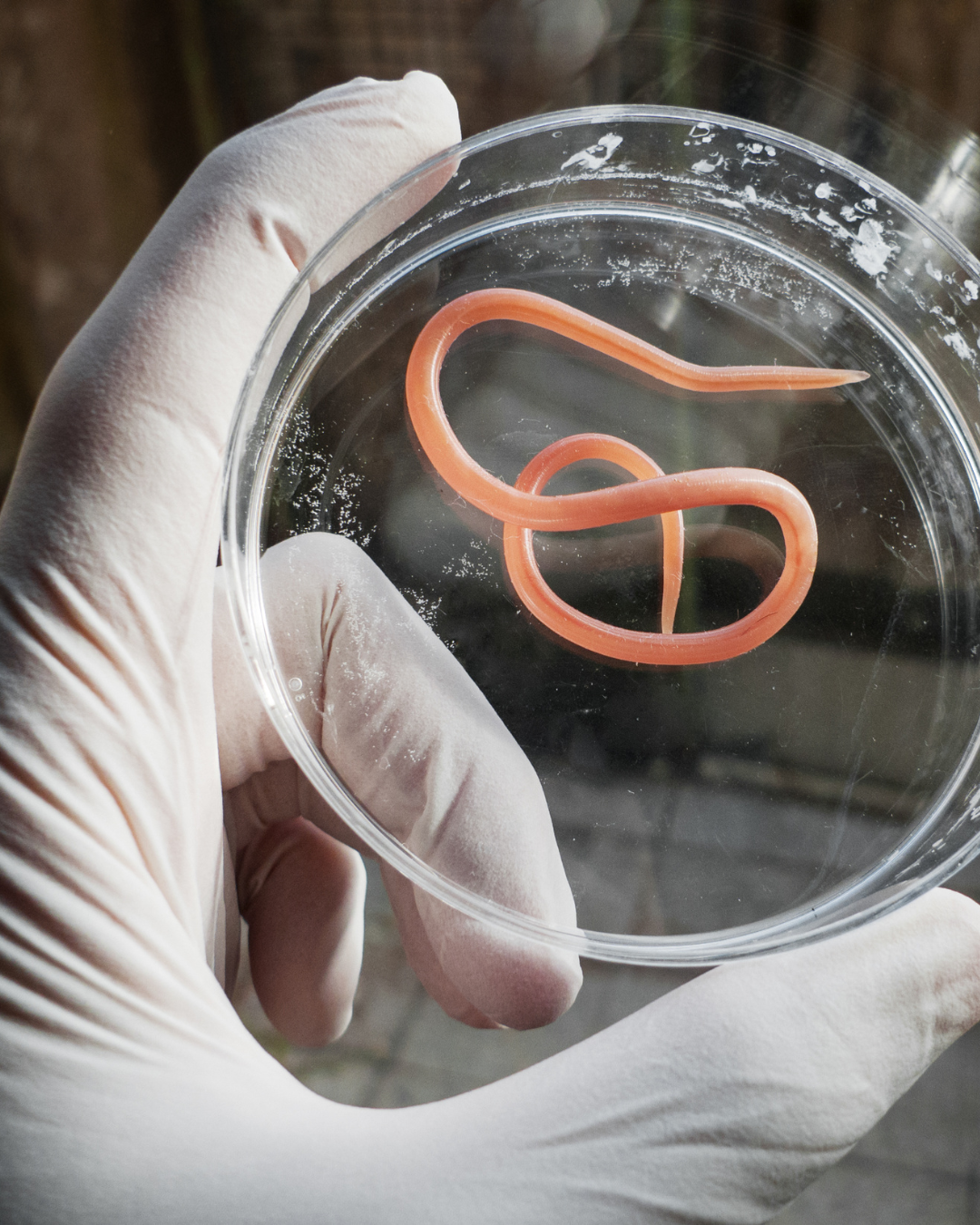
What are intestinal parasites and how do they affect your health?
You've been feeling tired for months without any apparent reason . You sleep well, try to maintain a balanced diet, and yet your energy remains low. Plus, your digestion has become a challenge : bloating , gas, abdominal discomfort, and seemingly unexplained changes in bowel movements. You've tried eliminating certain foods, taking probiotics, and even reducing stress, but nothing seems to work. Has this happened to you?
We often attribute these symptoms to a hectic lifestyle, food intolerances, or just plain "stress," but there's a lesser-known factor that could be behind all this: intestinal parasites . And no, this isn't something exclusive to tropical countries or people with poor hygiene. The reality is that anyone can be exposed to these microorganisms, regardless of where they live or how healthy their lifestyle is.
Most worrying is that parasites can live in our bodies for years undetected , affecting not only digestion but also our energy, mood, and even metabolism. They can steal essential nutrients , alter the gut microbiota, and generate chronic inflammation, triggering symptoms that are often confused with other digestive conditions.
If you've ever felt constantly bloated, tired, or crave certain foods , it's time to ask yourself: Could parasites be to blame? In this article, I'll explain what intestinal parasites are, how they can affect your health, and what you can do to eliminate them naturally and effectively .
What are intestinal parasites?
Intestinal parasites are microorganisms that live in the gastrointestinal tract and feed on the nutrients we ingest, often without us realizing their presence . Although they can go unnoticed for years , intestinal parasites can cause everything from mild digestive discomfort to chronic health problems . There are different types of parasites, and the most common are divided into two broad categories: protozoa and helminths .
- Protozoa : These are single-celled organisms that multiply rapidly and can affect both people and animals. The most common protozoa include Giardia lamblia , which causes chronic diarrhea , bloating , and fatigue , and Blastocystis hominis , which is associated with symptoms such as gas , stomach upset , and bowel movements . Other protozoa, such as Entamoeba histolytica , can cause serious infections in the gut , leading to ulcers and abdominal pain . These parasites live mainly in the small or large intestine , where they can remain for long periods , affecting nutrient absorption and disrupting the gut microbiota .
- Helminths : They are multicellular parasites , also known as intestinal worms , which are usually much larger than protozoa. Among the most common are roundworms ( Enterobius vermicularis ), which cause intense itching in the anal area, especially in children. The taenia or tapeworm is another common parasite that can reach several meters in length in the intestine and cause abdominal pain , nausea , weight loss and nutritional deficiencies . Ascaris lumbricoides , a roundworm that can measure up to 30 cm , lodges in the small intestine and can cause intestinal obstructions , malabsorption of nutrients and other digestive disorders . These parasites lay their eggs in different parts of the intestine or even in the tissues, and can be excreted in the feces , contaminating the environment and facilitating their reinfection .
The most concerning thing about intestinal parasites is that they not only affect digestion , but they can also negatively impact energy , mood , and overall metabolism . By robbing us of essential nutrients and disrupting the balance of our gut microbiota , parasites trigger symptoms that can be mistaken for other digestive conditions, such as irritable bowel syndrome or gut dysbiosis .
How do you get intestinal parasites?
Although it may seem that parasites only affect people with poor hygiene habits, the reality is that anyone can be exposed to them through:
- Contaminated water : Drinking unsafe water or eating food washed with contaminated water is one of the most common ways of infection.
- Raw or undercooked foods : Especially meats, fish and vegetables that have not been washed properly.
- Contact with contaminated surfaces : Dirty hands, money, public restrooms, or even contact with animals can be sources of infection.
- Person-to-person transmission : In family or school environments, parasites can spread easily.
Symptoms of an intestinal parasite infection
Intestinal parasites can cause a wide variety of symptoms, which are often overlooked or confused with other digestive conditions or common health problems. Because they can live in the intestine for extended periods without causing obvious symptoms, many people don't realize they are infected until symptoms become more severe. Parasites can affect different bodily functions, from digestion to overall energy, and their symptoms can vary in intensity and duration.
Among the most common symptoms of an intestinal parasite infection are:
Persistent bloating and gas : One of the most common symptoms of intestinal parasites is abdominal bloating and excessive gas . This occurs because the parasites interfere with the digestion of food, leading to fermentation and gas production. These symptoms may worsen after meals, especially with foods that ferment in the gut, such as carbohydrates.
Chronic diarrhea or constipation : Parasites can disrupt the digestive system's balance, causing both diarrhea and constipation . Chronic diarrhea is more common in protozoan infections like Giardia lamblia , while helminths can cause episodes of constipation or even intestinal obstruction due to the worms' size.
Nausea and digestive discomfort : The presence of parasites can cause nausea , especially upon waking or after eating. This digestive discomfort may be accompanied by a feeling of heaviness, indigestion, or diffuse abdominal pain . As the parasites multiply, they can disrupt the normal functioning of the digestive system, contributing to the onset of these symptoms.
Fatigue and Lack of Energy : Parasites rob the body of essential nutrients like vitamins, minerals, and other important energy components, which can result in a persistent feeling of fatigue or general tiredness . People affected by parasites often experience unexplained exhaustion, even if they are sleeping well and maintaining a healthy lifestyle.
Anal itching (especially at night) : Parasites such as roundworms ( Enterobius vermicularis ) can cause intense itching in the anal area, especially at night when the female parasites are laying their eggs. This uncomfortable sensation can disrupt sleep and is a classic sign of a parasitic infection, especially in children.
Uncontrollable cravings for sweets or flour : Some parasites, such as taenia or nematodes , can disrupt hormonal balance and cause intense cravings for certain foods, such as sweets or refined flour . This is because parasites need these foods to feed more efficiently and replicate in the body, which can create an irresistible desire to consume them.
Headaches or concentration problems : Toxicities caused by parasites can affect the central nervous system, often resulting in frequent headaches and concentration problems. These symptoms may be related to the release of toxins by the parasites or the general exhaustion they cause in the body.
Mood swings such as anxiety or irritability : The impact of parasites isn't limited to the digestive system. Disruption of intestinal balance can also affect the nervous system , contributing to symptoms such as anxiety , irritability , mood swings, and, in some cases, depression. This is because the connection between the gut and the brain, also known as the gut-brain axis , can be disrupted by the presence of parasites.
How to eliminate intestinal parasites?
If you suspect you may have intestinal parasites, it's best to perform a specialized stool test to confirm their presence. If the diagnosis is positive, you can follow some key steps to effectively eliminate them. These steps should be part of a comprehensive approach that combines dietary changes, the use of herbal medicine and supplements, and good hygiene practices to prevent reinfections.
If you'd like to take a specialized test to determine if you have parasites, contact info@mpunti.es and we'll let you know how we can help.
Anti-parasitic feeding
Diet plays a fundamental role in eliminating parasites . Parasites feed primarily on refined sugars and ultra-processed foods , so it's crucial to reduce their consumption during treatment. At the same time, you should include foods with antiparasitic properties that promote the elimination of these microorganisms. Some of the most effective are:
-
Garlic : Known for its antimicrobial and antiparasitic properties, garlic can help eliminate parasites and strengthen the immune system.
-
Pumpkin seeds : These seeds have properties that help paralyze parasites and facilitate their elimination through feces.
-
Papaya : Contains digestive enzymes that promote the destruction of parasites, especially papaya seeds, which are very effective against certain types of worms.
-
Ginger : This tuber has anti-inflammatory properties and can help relieve digestive discomfort associated with the presence of parasites.
-
Oregano oil : With strong antimicrobial properties, this oil is effective in combating various types of intestinal parasites.
In addition, it is essential to increase fiber consumption , especially in the form of prebiotics (resistant starch), to help expel parasites from the body through feces, improving intestinal transit.
Phytotherapy and supplements
Phytotherapy offers a range of herbs and plants with antiparasitic properties that can be very effective . Some of the most commonly used include:
-
Black Walnut : Black walnut extract contains juglone , a substance with powerful antiparasitic and antifungal properties . It is effective in eliminating intestinal parasites such as roundworms and tapeworms, and also helps cleanse the intestine of toxins , creating a less favorable environment for parasites.
-
Berberine : Berberine is a natural compound with potent antiparasitic and antimicrobial properties . It has been shown to be effective in fighting intestinal parasites such as Giardia and Entamoeba histolytica , weakening their ability to survive and multiply in the gut.
-
Wormwood and Clove : Wormwood is known for its ability to weaken and eliminate intestinal parasites , particularly roundworms and tapeworms. Its antiparasitic action is complemented by clove , which is very effective at destroying parasite eggs and interrupting their life cycle.
-
Probiotics : Once the parasites have been eliminated, restoring the gut microbiota is crucial to preventing new infections. Probiotics help repopulate the gut with beneficial bacteria, strengthening the immune system and balancing intestinal pH. Some of the most effective probiotics for this purpose include Lactobacillus rhamnosus , Bifidobacterium lactis , Saccharomyces boulardii , and Lactobacillus acidophilus .
Hygiene and prevention strategies
To prevent future infections, it is crucial to follow a series of hygiene strategies that help eliminate parasites from the environment and reduce the risk of reinfection:
-
Wash your hands thoroughly : Especially after using the bathroom, handling raw foods, or touching surfaces that may be contaminated.
-
Cook meat and fish thoroughly : Make sure meat and fish are thoroughly cooked, as parasites are often found in raw or undercooked foods.
-
Avoid drinking unsafe water : Drink filtered or boiled water to reduce the risk of consuming parasites present in the water.
-
Maintain good hygiene at home and in the kitchen : It is important to disinfect surfaces, utensils, and especially the area where food is prepared, to avoid cross-contamination.
Eliminating intestinal parasites requires a comprehensive, patient, and consistent approach. If you suspect you have parasites, it's best to consult a professional with an integrative approach for personalized treatment that combines nutrition, herbal medicine, and healthy habits to ensure a complete recovery.
Conclusion
Intestinal parasites can be behind many digestive and systemic problems without us even knowing it. If you experience persistent symptoms such as bloating, fatigue, or chronic digestive issues, considering a possible parasitic overgrowth could be key to improving your health.
Remember that everyone is different, and if you have any questions, it's best to consult a professional who can help you customize your bowel elimination and recovery strategy. Your well-being starts with a healthy gut!
